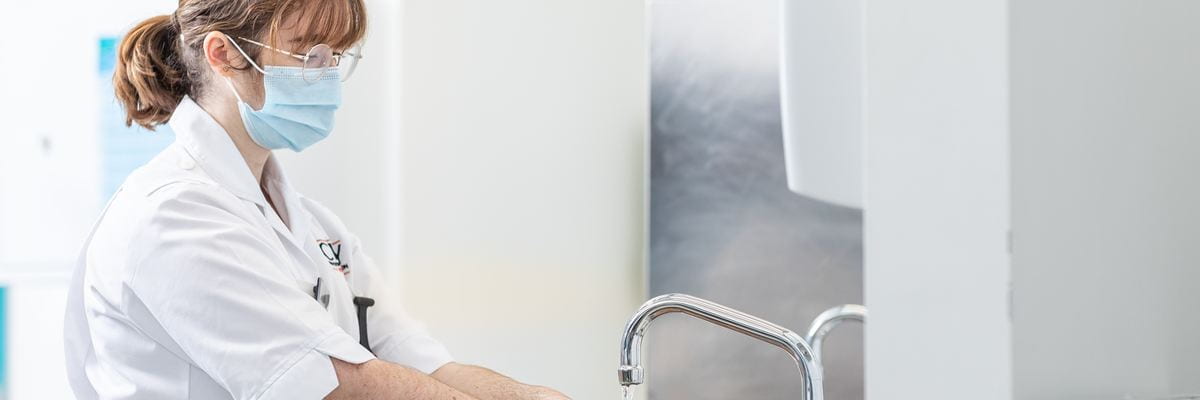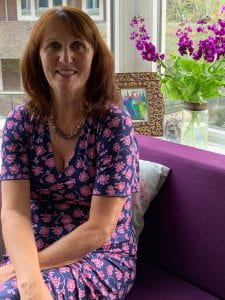In conversation with Professor Debra Salmon, Dean of the School of Health Sciences at City, University of London
“… we’re really proud, but we’re a bit tired.”
It sounds like the understatement of the year, especially after a year like 2020 when Professor Debra Salmon’s students, staff, and alumni came up against a challenge none of them had experienced before. According to Professor Salmon, there is much to learn to ensure we are able to meet the challenges of the future.
There is one thing Professor Debra Salmon, Dean of the School of Health Sciences at City, University of London, has no doubts about and that is the commitment and passion her students and staff, and the wider health care community, have shown during the Covid-19 pandemic.
“Our students in particular had a whole range of challenges in their personal lives,” Professor Salmon says.
“But irrespective of the challenges they were facing, they were able to put the needs of others; patients, their families, the wider community, first. And I think it was really inspirational to observe the ways in which a group of people, early in their careers, were just so prepared to step up.”
When the pandemic hit and the majority of University staff and students had to continue their work from home, students in the School of Health Sciences were deployed to NHS trusts as part of the workforce.
“The fact students stepped up at such a challenging time, with such good grace, and so willingly, was absolutely inspiring”, Professor Salmon explains.
“I think students saw that they would be well placed to help. The alternative was going to be volunteers who hadn’t had any formal health care training. Somebody was going to have to look after all these people.”
It doesn’t mean those who agreed to work on the frontlines didn’t experience anxiety.
“People were very fearful because the methods of transmission of the virus weren’t completely clear in the early days of the pandemic, nor were people confident about the availability of PEE and the degree to which they were going to be protected. And there was always the possibility that you were going to be taking this infection back to your family.”
The risks would soon become evident as hospital staff around the UK began to contract Covid-19.
“You’ll be aware that we lost a number of our alumni and our colleagues within the NHS. We can never be absolutely certain about how people contracted Covid-19, but we certainly know healthcare professionals were at more risk because they were in closer contact with the virus,” Professor Salmon says. “I think those losses have been very difficult for staff and students across the School, because they are personal and close to home.”
The School still had a duty of care of their students while they were working on the frontline, and staff made it their mission to keep them safe by providing risk assessments, helplines so students could report problems, and pastoral care. Students received personal phone calls from the School’s staff so they could discuss any concerns before taking on frontline roles, and those who had underlying health conditions were exempt.
Professor Salmon believes being the Dean of the School of Health Sciences is the best job you can have, but the past year has no doubt been the hardest year of her career.
“The most challenging part has been making very difficult decisions, and knowing the decisions that you make can or probably will have life-altering consequences.”
She’s also aware of how tough the past year has been on the School’s academic and professional staff. Some academic staff returned to frontline roles on top of their roles at the University, providing relief to units that were already short-staffed. All staff in the School also had to manage the day-to-day challenges of maintaining operations during a pandemic and the additional work required to support students who were also working professionally under challenging circumstances. At the same time, the advice and demands from the Government kept changing.
Professor Salmon doesn’t believe the UK was appropriately prepared for the pandemic.
“I think there were a number of Government decisions that meant our preparation was poor. We lacked any anticipation of the demands on the NHS and the wider public health community and care sector, not least in terms of workforce capacity.”
She thinks it was a mistake that some of the preliminary work on how to manage a pandemic was stood down in 2016, given that those who worked in public health knew it was an inevitability. To further assist in the effort, the School donated their available PPE stock to hospitals across London, and facilitated PPE deliveries to care homes that were struggling to get hold of the right protection.
A year after the pandemic began it is still causing tragedy across the world and Professor Salmon is trying to understand what her students are going through and how they can be supported in the future.
“Similar to other research, we’ve shown that the effect of Covid-19 is enduring and actually worsens over time. One research study in the School, led by Judy Brook (Associate Dean for Partnerships and Placements), has focused on the experience of working on the frontline during the pandemic, and has shown that health care workers are displaying post-traumatic stress symptoms, and this has far-reaching implications for their health and wellbeing.”
It couldn’t have been a more challenging time to start your health care career, be that in nursing, midwifery, or the allied health professions.
“It’s a very developmental point in their professional career, so to be exposed to that level of challenge, and in some cases trauma, as a School we will be focussing on ensuring students have the full support they’re going to need going forward.”
And what about the future of the country? Professor Salmon is convinced public health research and solutions are going to be crucial to avoid a similar outcome in another pandemic.
“Any lessons from the pandemic will contribute to informing changes to clinical education, but also, will form part of wider discussions about where the focus needs to be now,” Professor Salmon explains. “It’s absolutely clear that because health inequalities were so great going into the pandemic we were in a very poor position, and this is why we’ve seen particular groups of people disproportionately affected.“
“What we’ve seen here is more people having died from poor communities. And they’ve also now suffered all the consequences of the lockdown. Going forward, I’m absolutely committed that we have to think about poverty, mental health, long-Covid, and lost learning for young people because it’s going to disproportionately impact those young people and children that needed the education the most.”
The Alumni Relations team and Alumni Community extend our gratitude to all staff of the School of Health Sciences and the healthcare workers for the commitment and passion they show in their ongoing work.

